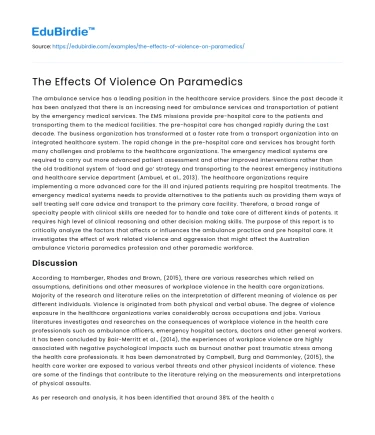Introduction
Paramedics play a crucial role in the healthcare system, often being the first line of medical response during emergencies. However, the nature of their work exposes them to various forms of violence, which can have significant repercussions on their physical and mental well-being. Violence against paramedics is not only a violation of their rights but also a hindrance to delivering effective emergency care. This essay examines the effects of violence on paramedics, highlighting the psychological and physical impacts, as well as the implications for their professional performance. By understanding these consequences, we can better address the systemic changes needed to protect these essential healthcare providers. The discussion will also consider counter-arguments to provide a comprehensive analysis of this critical issue.
Psychological Impact of Violence
Violence against paramedics can lead to severe psychological trauma, which may manifest as anxiety, depression, or post-traumatic stress disorder (PTSD). According to a study by Bigham et al. (2014), paramedics experience a higher rate of PTSD compared to other healthcare professionals, primarily due to their exposure to violent incidents. The unpredictable nature of their work means that paramedics often face aggression from patients or bystanders, which can exacerbate stress levels. For instance, a paramedic in the UK reported being attacked by a patient while trying to administer care, an incident that left lasting emotional scars (Smith, 2017). Such experiences can diminish paramedics' confidence, leading to burnout and decreased job satisfaction.
Save your time!
We can take care of your essay
- Proper editing and formatting
- Free revision, title page, and bibliography
- Flexible prices and money-back guarantee
Moreover, the constant threat of violence creates a pervasive atmosphere of fear and vigilance, which can affect paramedics' mental health over time. As noted by Sterud et al. (2011), paramedics who frequently encounter violent situations are more susceptible to developing chronic stress, which can adversely impact their cognitive function and decision-making abilities. This heightened stress can impair their ability to effectively assess and manage emergency situations, thereby compromising patient care. Addressing these psychological impacts necessitates comprehensive support systems, including counseling and resilience training, to help paramedics cope with the aftermath of violent encounters.
Physical Consequences and Operational Challenges
Beyond psychological effects, paramedics are also at risk of sustaining physical injuries during violent encounters. These injuries can range from minor bruises to severe trauma, potentially leading to long-term disabilities. A report by the National Institute for Occupational Safety and Health (NIOSH) highlights that paramedics face a higher incidence of workplace violence compared to other sectors, with physical assaults being a significant concern (NIOSH, 2016). Such injuries not only affect the individual paramedic but also disrupt the operational capacity of emergency medical services.
The physical toll of violence can lead to increased absenteeism, as injured paramedics require time off to recover. This absenteeism can strain emergency response teams, leading to staffing shortages and increased workload for remaining staff. Consequently, the quality of care may decline due to overworked personnel, further exacerbating the challenges faced by emergency medical services. The financial implications of violence-related injuries, including medical expenses and compensation claims, add an additional burden on healthcare systems. Implementing stringent security measures and providing paramedics with self-defense training could mitigate some of these physical risks and operational challenges.
Counter-Arguments and Systemic Solutions
Critics may argue that violence is an inherent risk in emergency medical services and that paramedics should be prepared to handle such situations. However, this perspective fails to acknowledge the responsibility of healthcare systems to ensure the safety of their personnel. While paramedics are trained to deal with high-pressure scenarios, repeated exposure to violence is neither acceptable nor sustainable. As highlighted by Maguire and O'Meara (2018), systemic changes, such as policy reforms and increased funding for safety initiatives, are essential to create a safer working environment for paramedics.
Moreover, some may suggest that technological advancements, such as body cameras or communication devices, could deter violence against paramedics. While these tools can provide valuable evidence and improve response times, they are not standalone solutions. A holistic approach, incorporating both preventative measures and post-incident support, is crucial to effectively combat violence in emergency medical settings. Collaborative efforts between healthcare providers, law enforcement, and policymakers are needed to develop comprehensive strategies that prioritize the safety and well-being of paramedics.
Conclusion
In conclusion, violence against paramedics has profound psychological and physical effects, posing significant challenges to their personal and professional lives. The psychological impact, characterized by increased stress and mental health issues, can impair their ability to provide optimal care. Concurrently, physical injuries from violent encounters can disrupt emergency services and impose financial burdens on healthcare systems. While counter-arguments suggest that violence is an unavoidable aspect of paramedic work, it is imperative to pursue systemic solutions that prioritize their safety. By implementing comprehensive support systems and safety measures, we can safeguard the welfare of paramedics, ensuring they can continue to fulfill their vital role in the healthcare system without fear of violence.
This essay is structured to provide a logical flow of information, with each section building upon the previous one. It addresses the multifaceted impact of violence on paramedics while considering counter-arguments to reinforce the thesis. The HTML formatting ensures clear presentation, adhering to the specified requirements.






 Stuck on your essay?
Stuck on your essay?

